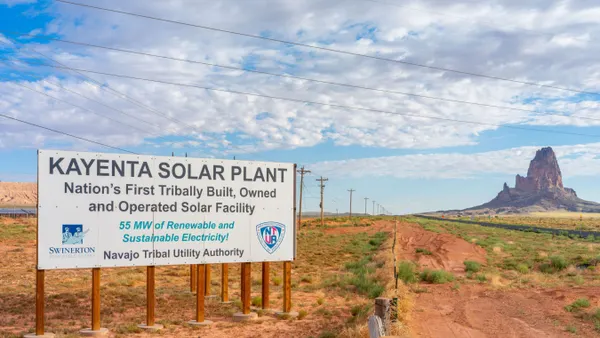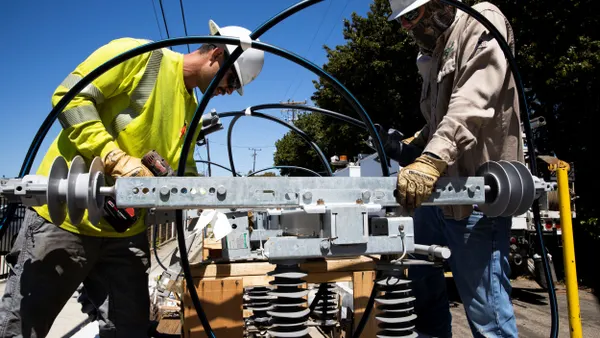Dive Brief:
- Stakeholders have filed initial comments with the Arizona Corporation Commission (ACC) regarding the state's electric vehicle (EV) development policy, laying out a broad range of topics they believe will require more focus as the state moves ahead with implementation. The comments build on a workshop the commission held March 14 in Phoenix.
- Tucson Electric Power told the commission it believes a Demand-Side Management (DSM) surcharge to fund EV programs is "appropriate," particularly as infrastructure development is just getting started. Other comments covered the need for commercial charging rates, the appropriateness of utility-owned charging equipment, and the value of flexible pilot programs.
- The ACC in December adopted a new policy encouraging investor-owned utilities to develop rates and pilot programs supporting EV growth, and regulators are now working on an implementation plan. Another stakeholder meeting is planned for March 26 to discuss possible energy rule changes to boost EV adoption.
Dive Insight:
Arizona utilities are already developing EV pilot programs, but regulators are still working on how to implement a broader policy statement adopted last year that ensures utilities can recover "prudent costs" spent to develop charging infrastructure.
Demand charges are shaping up to be a focus of debate in the proceeding, as they have in other states. Utilities rely on those charges to pay for transmission needed to meet peak demand, but stakeholders say they are incompatible with charging station economics. Both Tesla and EVGo warned regulators against their use.
In comments filed March 21, Arizona Public Service told the commission it believes public utilities should work to expand EV infrastructure, educate customers on the benefits of electrified transportation and develop "appropriate tariff structures that encourage off-peak charging."
"APS suggests that this collaborative process should be focused on a long-term implementation plan, once utilities have had a chance to implement pilot programs encouraged by the Commission," the utility said. "Executing pilot programs prior to developing a long-term implementation plan will provide valuable knowledge to ensure the overall success of that plan."
APS also said it wanted to emphasize the "value of flexibility" in the implementation of EV pilot programs, "in order to maximize their educational value in meeting longer term goals."
TEP, along with indicating possible support for a DSM surcharge, told regulators there are a range of possible rule changes needed to assist in the development of infrastructure, including modifications to line extension policies to encourage investment in "make ready" infrastructure for charging stations, and adopting EV incentives that align with customer charging with system benefits.
"Using the framework of energy efficiency implementation plans and the DSM surcharge enables utilities to properly manage and track EV activities, program costs, and system benefits and impacts," TEP said.
Along with the utilities, a range of other stakeholders weighed in as well.
EVGo, which already operates in the Tucson and Phoenix markets, told the ACC that commercial EV charging rates are "critical for increasing the viability of transportation electrification for renters, fleets, rideshare drivers, and others who utilize public fast charging."
EVGo also called on regulators to "minimize demand charges" and maximize the use of time-of-use volumetric rates, "particularly when utilization of the charging infrastructure is low."
Demand charges are a particular problem for DC Fast Charging stations, because they typically have high peak demand with low utilization rates. It is an issue being tackled across the nation: In a report made public last week, staff of the Vermont Public Service Department recommended utilities offer a pathway for "immediate relief" from the charges, to spur infrastructure development.
Eliminating demand charges "does not create a cost shift if TOU rates are cost-based and represent incremental revenues," EVGo told Arizona regulators. "Emphasizing accurate TOU rates over demand charges ensures that operators of DC fast chargers focus on encouraging their customers to charge at times that provide the most system benefits, rather than trying to minimize demand charges."
Tesla weighed in on tariffs as well, asking the commission to be wary of demand charges.
"Providing rate relief to EV charging stations through new rate options that bring their electricity costs more closely in line with the commercial class average can increase DCFC investments and EV adoption," the automaker told regulators. "The creation of new rates is warranted given increased EV adoption will result in significant ratepayer benefits achieved on the residential side."
Other issues raised by parties in the ACC proceeding are also familiar to other state EV efforts.
Arizonans for Electric Choice and Competition (AECC) told regulators that development of charging infrastructure should be led by the competitive market rather than IOUs.
"The proliferation of EV charging stations in Arizona should continue to be supported by the competitive market," the group said. "AECC believes that the Commission should not seek to establish another monopoly service in the form of EV charging infrastructure when such infrastructure needs and services to a large extent already have been and can continue to be provided by private stakeholders within the competitive market."














